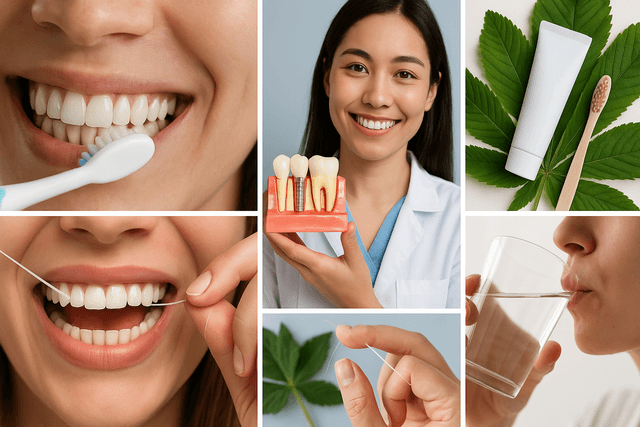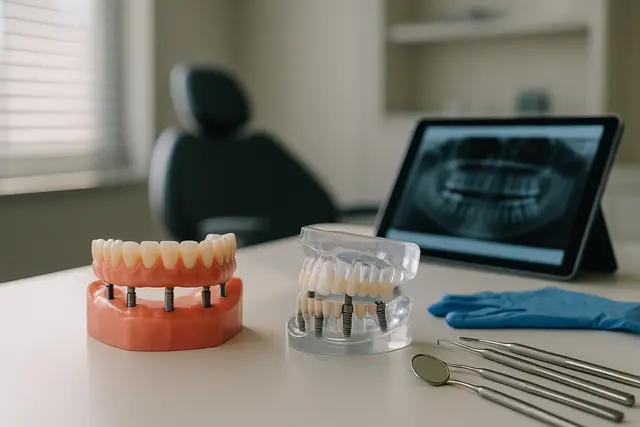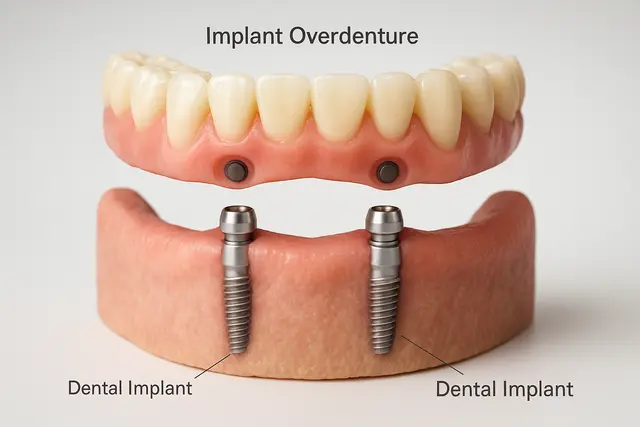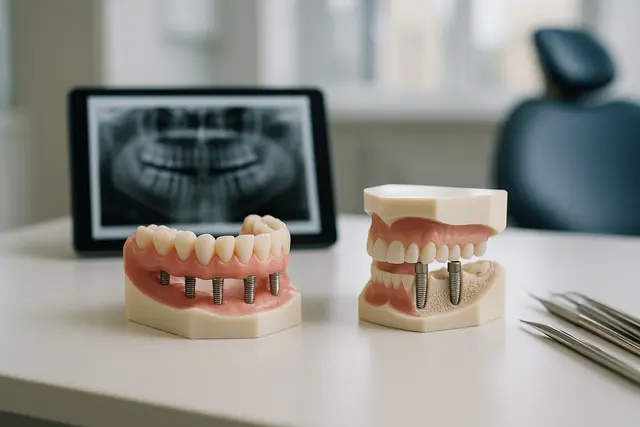Prosthodontics
5 min read
Oct 16, 2025
Best Practices for Implant After Care
Dental implants are a life-changing solution for restoring your smile, but the work doesn’t end once you leave the dentist’s chair. Proper aftercare is essential to ensure your implants heal correctly and last for years. Understanding what to do, and what to avoid, can make all the difference in your recovery.

So, you finally did it. You got that dental implant you’ve been thinking about for months, or maybe years. Whether you're replacing a single missing tooth or making peace with a full smile makeover, getting dental implants is a big (and smart) step toward reclaiming your confidence, your bite, and let’s face it, your life.
Now, let’s talk about what comes next: the healing. This isn’t just about waiting it out. Dental implant aftercare is where the magic happens. The better care you give your new implant now, the higher the chances of implant success for years to come.
Dental Implant Aftercare Starts Right After Surgery
Your dentist probably handed you a sheet of care instructions while you were still a little woozy, but let’s break it down like a friend would.
The first 24 hours after dental implant surgery are absolutely crucial. This is the time to rest, keep your head elevated, and avoid anything that could apply pressure on the implant site. That means no spitting, no straws, and definitely no rinsing your mouth aggressively. You want to protect the blood clot forming around your new implant like it’s gold.
Pro tip: gently bite on gauze as instructed to reduce bleeding, and use cold compresses to keep swelling in check.
Post-Surgery Tips That Actually Help
The healing process may be slow and steady, but there are ways to speed it up safely and prevent infection while you're at it.
First, skip the gym for a few days. Vigorous exercise too soon can increase blood flow to the surgical site and trigger bleeding. Instead, give your jawbone a break and let your body do its thing.
Eat soft foods like scrambled eggs, mashed potatoes, or smoothies (with a spoon, not a straw!). This isn’t the time to test your teeth on anything hard or crunchy. The goal is to avoid damaging the implant surface or compromising the implant in any way.
Implant Care Is All About Consistent Attention
Look, dental implants are built to last, but only if you treat them right. Implant care means babying your new implant in the beginning and treating it like your natural teeth for the long haul.
That starts with maintaining good oral hygiene. Brush gently but thoroughly using a soft-bristled toothbrush and floss at least once daily. Seriously, floss is your friend now. And not just any floss, use floss designed for dental implants or try interdental brushes if you prefer.
You should also rinse your mouth with warm salt water several times a day, especially after meals. It helps reduce bacteria without being too harsh on your healing gums.
Dental Implant Care Beyond the Basics
There’s brushing and flossing, sure. But good implant aftercare also includes watching for the little red flags. Is the surgical site swelling more than expected? Do you notice pain increasing after the first few days? If something feels off, don’t wait. Contact your dentist immediately.
Sometimes implant failure happens when people ignore small issues until they become big problems. Trust your gut and follow the instructions carefully. It's your mouth, you're the first to know when something doesn’t feel right.
Also, don’t skip your dental checkups. Even if everything looks great on the outside, your dentist can monitor the health of the implant post, the jawbone underneath, and the gum tissue around the implant.
Dental Care Habits That Make a Difference
Even with new implants, your daily dental hygiene routine matters just as much as it did before. Actually, probably more.
Here’s your cheat sheet:
Brush twice daily and floss at least once daily.
Use a soft-bristled toothbrush to avoid irritating the gum or damaging the implant surface.
Floss or use interdental brushes to clean gently around the implant.
Stick to regular dental appointments for cleanings and monitoring.
Avoid tobacco and limit alcohol, both can mess with healing.
Practicing good dental care keeps your implants healthy and helps maintain your overall oral health.
Getting Dental Implants Means Playing the Long Game
Remember, you’re not just healing from minor surgery. You’re integrating a new structure into your jawbone, which takes time. The weeks after surgery are critical for bone-to-implant fusion, and that process doesn’t rush for anyone.
Be patient. Don't chew on the implant site, and don’t test it with sticky foods, even if you’re feeling better. Chewing on the wrong side too soon can create pressure on the implant site and slow the healing process, or worse, cause failure.
Care Instructions to Keep You on Track
Keep these care tips on your fridge or bathroom mirror. Better yet, make them a habit.
Always follow the instructions your oral surgeon gave you, even if you feel fine.
Clean gently around your implants every day.
Use mouthwash if your dentist recommends it, but avoid anything alcohol-based right after surgery.
Don't use your teeth to open packages or chew pens (you know who you are).
Stay away from hard or crunchy foods for at least the first few weeks after surgery.
Prioritize good oral hygiene to reduce bacteria and inflammation around your implants.
Care for Your Dental Implants Like They’re Part of You
Because they are now! Whether you had one implant or several, implant care is all about building habits that support long-term success. That includes being gentle but thorough with cleaning, eating mindfully, and committing to consistent care routines.
Think of it like this: these implants don’t get cavities, but the gum around the implant can still get infected if you slack on care. That means flossing around the implant, brushing with intention, and never ignoring soreness or bleeding.
Proper Aftercare Is the Key to Keeping Your Implants Healthy
So what does proper aftercare really mean?
It means not skipping a day of oral hygiene. It means not skipping dental checkups. It means not treating your new implants like they’re indestructible (because they’re not).
Implant success isn’t luck, it’s all about the care and attention you give them every single day. From the first few days after surgery to the years ahead, your efforts directly affect how long your smile stays strong and beautiful.
What Should I Do Immediately After Dental Implant Surgery?
In the first 24 hours after surgery, rest is key. Keep your head elevated, avoid spitting, rinsing, or using straws, and gently bite down on gauze to control bleeding. Applying a cold compress can help reduce swelling. These steps help protect the blood clot forming around your implant, which is vital for proper healing and implant success.
How Can I Speed Up Healing Without Compromising the Implant?
Avoid strenuous activity for at least a few days post-surgery. Eat soft foods like yogurt or mashed potatoes, and skip anything crunchy, sticky, or hard. Stick to a gentle oral hygiene routine, brush with a soft toothbrush, floss with implant-friendly tools, and rinse with warm salt water after meals. These habits support healing and reduce the risk of infection.
What Are the Signs That Something Might Be Wrong With My Implant?
If you experience increased pain, swelling, persistent bleeding, or a loose feeling around the implant, those are red flags. Bad breath or an unpleasant taste can also signal infection. Don’t wait, contact your dentist right away. Early intervention can prevent implant failure and help save your smile.
How Do I Maintain My Implant for the Long Term?
Practice excellent daily oral hygiene: brush twice a day with a soft-bristled brush, floss with implant-specific floss or interdental brushes, and never skip dental checkups. Avoid tobacco and limit alcohol, both of which can slow healing and increase infection risk. With consistent care and regular monitoring, your dental implant can last for decades.
Read Next
Related Posts

Prosthodontics
Implant Supported Dentures Overview
Missing teeth can impact more than just your smile, they can affect your confidence, comfort, and even your diet. Fortunately, modern dentistry offers a solution that’s both secure and natural-looking: implant-supported dentures. This innovative approach blends the stability of implants with the convenience of dentures to create a long-lasting, life-improving upgrade.
5 min read
Oct 29, 2025

Prosthodontics
Implant Overdentures Explained: The Hybrid Solution to Missing Teeth
Missing teeth can impact everything from your ability to eat to your self-confidence. While traditional dentures have long been a go-to solution, they often fall short in comfort and stability. Implant overdentures offer a modern alternative that combines the security of dental implants with the convenience of removable dentures, a true upgrade for those looking to reclaim their smile.
6 min read
Oct 29, 2025

Prosthodontics
Implant Retained Dentures Explained
Considering implant-retained dentures? You're not alone. As modern dentistry evolves, more people are turning to this secure, natural-feeling alternative to traditional dentures. This guide will walk you through what they are, how they work, and why they might be the solution you've been looking for.
4 min read
Oct 28, 2025
Don’t have time to research every dentist around you?
See why 30k+ patients trusted us